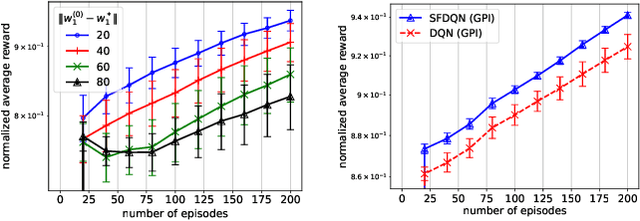SF-DQN: Provable Knowledge Transfer using Successor Feature for Deep Reinforcement Learning
Paper and Code
May 24, 2024



This paper studies the transfer reinforcement learning (RL) problem where multiple RL problems have different reward functions but share the same underlying transition dynamics. In this setting, the Q-function of each RL problem (task) can be decomposed into a successor feature (SF) and a reward mapping: the former characterizes the transition dynamics, and the latter characterizes the task-specific reward function. This Q-function decomposition, coupled with a policy improvement operator known as generalized policy improvement (GPI), reduces the sample complexity of finding the optimal Q-function, and thus the SF \& GPI framework exhibits promising empirical performance compared to traditional RL methods like Q-learning. However, its theoretical foundations remain largely unestablished, especially when learning the successor features using deep neural networks (SF-DQN). This paper studies the provable knowledge transfer using SFs-DQN in transfer RL problems. We establish the first convergence analysis with provable generalization guarantees for SF-DQN with GPI. The theory reveals that SF-DQN with GPI outperforms conventional RL approaches, such as deep Q-network, in terms of both faster convergence rate and better generalization. Numerical experiments on real and synthetic RL tasks support the superior performance of SF-DQN \& GPI, aligning with our theoretical findings.
 Add to Chrome
Add to Chrome Add to Firefox
Add to Firefox Add to Edge
Add to Edge